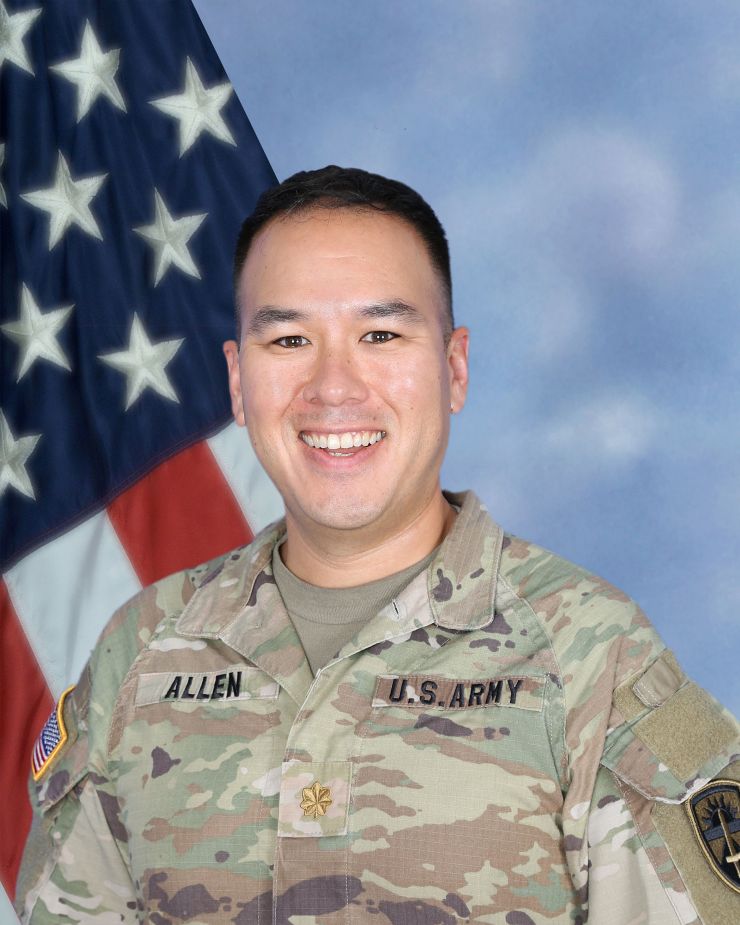
In observance of the JAG Corps Birthday, I spoke with Maj. Rufus C. Allen, the new Deputy Staff Judge Advocate at White Sands Missile Range.
WSMR welcomes Maj. Allen as we celebrate the JAG Corps Birthday
In observance of the JAG Corps Birthday, I spoke with Maj. Rufus C. Allen, the new Deputy Staff Judge Advocate at White Sands Missile Range.
Where are you coming from?
“I was enrolled in the Masters of Law (LLM) program at The Judge Advocate General's Legal Center and School (TJAGLCS) in Charlottesville, Va. While there, I received an LLM degree in Military Law with a concentration in contract and fiscal law. Prior to Charlottesville, I was stationed at Fort Shafter, Hawaii, where I was the Command Judge Advocate for the 18th Medical Command (Deployment Support).”
Where are you originally from?
“I am from Columbia, S.C. I studied classics and political science at Vanderbilt University in Nashville, Tenn., and got my law degree from Wake Forest Law School in Winston-Salem, N.C. I am a licensed NC attorney and practiced environmental law with the NC Attorney General's Office for almost 10 years prior to coming onto active duty.”
Why do you serve?
“I get to work every day with incredibly talented and dedicated men and women who care deeply about this country, our freedoms, and the good the U.S. Army can do in the world. I am proud to serve in an organization that cares about its people with a mission that ensures a safer and more secure future for our nation and our friends and allies.”
Why is it important to have a JAG?
“The U.S. Army JAG Corps is engaged in the most meaningful practice of law on earth. Army lawyers, military judge advocates and civilian DA attorneys, and paraprofessionals, 27Ds and civilian paralegals, offer perspective, advice, and guidance to commanders and leaders at all echelons on not just the law, but on a wide spectrum of risks. At the macro level, we are subject matter experts on process -- because doing something the right way is more significant to an organization in the long run as is getting to the "right" outcome. And, on the individual decision level, commanders regularly make decisions with enormous legal and regulatory consequences for people, and they care deeply about the people affected by their decisions.
The Army JAG Corps team is there to provide commanders and their staffs with that essential perspective and analysis.”
What do you enjoy doing in your spare time?
“I am enjoying discovering the outdoors of Southern New Mexico with my dog Ralph. We are looking forward to football weather, grilling outside, and trying out the local breweries.”
Every July 29, the Judge Advocate General’s Corps celebrates its birthday and history with a formal ceremony. This celebration pays tribute to the many individuals who built the Corps into what it is today. The Second Continental Congress elected William Tudor, one of John Adams’ law pupils, to serve as the first Judge Advocate of the Army July 29, 1775. The title “JAG” was attached a little more than a year later.
For approximately the next 70 years, The Office of the Judge Advocate General was informal and used only when needed by Congress and the President. This all changed with the advent of the Civil War and the significant increase in the number of Soldiers. Congress officially established the Judge Advocate General (TJAG) position July 17, 1862, with the rank of colonel. TJAG has been a permanent part of the Army since then. Throughout the years, TJAG’s rank has steadily increased. With the passing of the 2008 National Defense Authorization Act, Congress authorized the rank of lieutenant general for any current and future TJAG. Currently, Lt. Gen. Stuart Risch serves as the U.S. Army’s 41st TJAG.
By Miriam Rodriguez
WSMR Public Affairs




